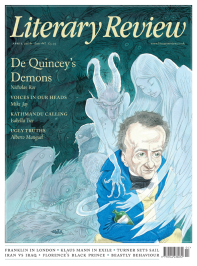Toby Lichtig
Nine Lives
All That Man Is
By David Szalay
Jonathan Cape 437pp £14.99
David Szalay’s latest ‘novel’ is really a collection of nine stories, each featuring a lost or unhappy man, away from home, in search of an elusive – or illusive – anchor. The tales are immediately involving, perfectly paced, rather sad; they are fully convincing little worlds peopled by fully convincing characters. There are no duds.
Szalay doesn’t do anything particularly innovative or showy. He doesn’t have to. He has the gift of readability: not that banal facility to make things ‘zip along’ so important to Stella Rimington’s Booker panel of 2011, but true literary readability, the knack of making life seem interesting wherever it is found. Two teenage interrailers moon about central Europe; an alcoholic expat is conned out of some cash; a high-end estate agent inspects property in Switzerland; a Danish journalist follows up a scoop. There is something arbitrary about Szalay’s setups – but in a good way. One feels he could just as easily be writing about Moldovan bicycle couriers or carpet fitters from the Costa Brava. His subjects are transience, displacement, disappointment – themes that don’t care for geography or station.
Each story focuses on a different life stage, and they are arranged chronologically: the first concerns a seventeen-year-old; the final character is seventy-three. In all of them the attendant yearnings and anxieties are surprisingly, uncomfortably alike.
In the opening tale, Simon is in Prague with his school friend Ferdinand. Simon is bookish, high-minded, witty, insecure, with a teenager’s sense of acute internal drama. Ferdinand, who is less complex and more successful with the ladies, is obviously in awe of his friend and lets himself be led around various churches and monuments, when all he really wants to do is go out on the lash. The two end up staying with a chain-smoking landlady who takes a shine to Simon. Ferdinand encourages him to respond to her overtures: ‘You might enjoy it, that’s all.’ But Simon is too busy thinking about what he doesn’t have to take advantage of the situation.
In the following story, Bérnard, a young university dropout, goes alone on a package holiday to Cyprus, his friend having pulled out. Szalay paints a wonderfully credible portrait of a callow, dopey man-child who drifts along hoping for the best and settling for what’s in reach: in this case an obese woman and her widowed mother, who display a remarkably forthright attitude to sex.
The Belgian philologist in a later tale is far more intellectually energetic than Bérnard but every bit as emotionally immature. Life is an open road for him: ‘he still thinks of his adulthood as something that is just getting under way.’ His career is going well and he has a no-strings relationship with a pretty Polish woman whose ‘New Agey’ side he finds easy to ignore (‘It wasn’t, he told himself, fundamental to who she was’). But when he discovers that she is pregnant, during a road trip through a claustrophobic nowhere town in Germany, life seems to close in on him. He is frightened, appalled. And he doesn’t hide it.
Szalay’s writing is always sensitive, often funny and brilliantly observed; he has an excellent eye for similes. A bodyguard, called to intervene when his client, a high-class hooker, hits the panic button, bursts into the room to find the bed linen ‘an energetic mess like stiffly whipped egg white’. The mountains in a sterile Alpine village look ‘like pictures of themselves’.
There is a hint of circularity to the final tale, in which a retired senior civil servant (and, it transpires, the grandfather of Simon from the opening tale) is confronted with his dwindling faculties and the sham of his marriage. This is a very poignant piece of writing, not least when the man has a realisation about the eternal passage of time – ‘everything else embodies, in its own impermanence, the one thing that never ends’ – only for his burst of excitement about this revelation to dissipate: ‘For a moment he had felt it. Felt it.’
There is something irritating about a collection of stories being passed off as a ‘novel’, a sense that the marketing people don’t trust the value of an important form. And yet All That Man Is does have the feel of a novel: in its evenness of tone, its thematic coherence, its driving sense of purpose. However you wish to classify it, this is a quietly dazzling book by a writer who thoroughly deserves his growing reputation.

Sign Up to our newsletter
Receive free articles, highlights from the archive, news, details of prizes, and much more.@Lit_Review
Follow Literary Review on Twitter
Twitter Feed
Johannes Gutenberg cut corners at every turn when putting together his bible. How, then, did his creation achieve such renown?
@JosephHone_ investigates.
Joseph Hone - Start the Presses!
Joseph Hone: Start the Presses! - Johannes Gutenberg: A Biography in Books by Eric Marshall White
literaryreview.co.uk
Convinced of her own brilliance, Gertrude Stein wished to be ‘as popular as Gilbert and Sullivan’ and laboured tirelessly to ensure that her celebrity would outlive her.
@sophieolive examines the real Stein.
Sophie Oliver - The Once & Future Genius
Sophie Oliver: The Once & Future Genius - Gertrude Stein: An Afterlife by Francesca Wade
literaryreview.co.uk
Princess Diana was adored and scorned, idolised, canonised and chastised.
Why, asks @NshShulman, was everyone mad about Diana?
Find out in the May issue of Literary Review, out now.
Literary Review - For People Who Devour Books
In the Current Issue: Nicola Shulman on Princess Diana * Sophie Oliver on Gertrude Stein * Costica Bradatan on P...
literaryreview.co.uk